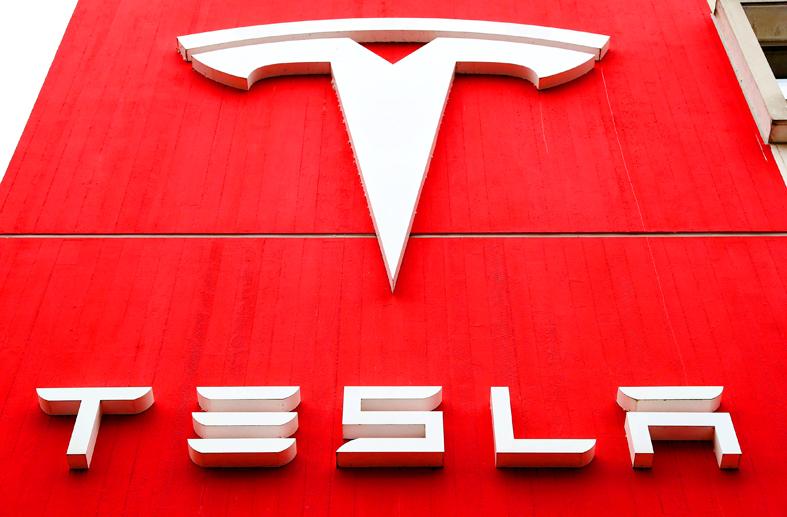Neoen SA yesterday said that it is to partner with Tesla Inc to install one of the world’s biggest lithium-ion batteries in Australia after reaching a grid connection deal with the power market operator.
The 300 megawatt Victorian Big Battery is planned for Geelong in Victoria state and use Tesla’s Megapack technology.
It would be double the size of Neoen’s Hornsdale site in South Australia state, which was the largest facility when it began operations in 2017.

Photo: Reuters
Installing the new system in Australia’s second-most populous state would help to modernize and stabilize the local grid, which is targeting 50 percent of its power to come from renewable sources by 2030, Neoen said in a media release.
The Paris-based company is targeting the battery to be operational by the end of next year.
Battery storage technology is being deployed on an ever-growing scale to meet demand to back-up the surge in wind and solar power generation.
About US$951 billion would be invested in the technology through 2050, with two-thirds deployed on utility-scale systems, BloombergNEF forecasts showed.
Tesla is seeing rising demand for grid-scale batteries and the new Australian project would offer further evidence that the systems are suitable to back up intermittent wind and solar power, Tesla chairwoman Robyn Denholm told a webinar.
“What we’re seeing is many energy operators around the world don’t want to renew their fossil fuel-type turbines, they want to put storage in, they want to harness renewable energy,” Denholm said.
Tesla founder Elon Musk has previously said that the firm’s energy business could one day rival its electric vehicle division in size.
Neoen’s Hornsdale lost its status as the world’s biggest storage battery to a facility near San Diego, California, which began operations this year. Several other larger battery projects are planned, including in the US and China, BloombergNEF data show.
“The big battery will help protect our network in summer, create jobs and drive down energy prices, as well as supporting our recovery from the coronavirus pandemic,” Victoria Minister for Energy, Environment and Climate Change Lily D’Ambrosio said in a separate statement.
The new project in Victoria would be supported by a 250 megawatt grid services contract with the Australian Energy Market Operator and would also partner with network provider AusNet Services, Neoen said.

UNCERTAINTY: Innolux activated a stringent supply chain management mechanism, as it did during the COVID-19 pandemic, to ensure optimal inventory levels for customers Flat-panel display makers AUO Corp (友達) and Innolux Corp (群創) yesterday said that about 12 to 20 percent of their display business is at risk of potential US tariffs and that they would relocate production or shipment destinations to mitigate the levies’ effects. US tariffs would have a direct impact of US$200 million on AUO’s revenue, company chairman Paul Peng (彭雙浪) told reporters on the sidelines of the Touch Taiwan trade show in Taipei yesterday. That would make up about 12 percent of the company’s overall revenue. To cope with the tariff uncertainty, AUO plans to allocate its production to manufacturing facilities in

TAKING STOCK: A Taiwanese cookware firm in Vietnam urged customers to assess inventory or place orders early so shipments can reach the US while tariffs are paused Taiwanese businesses in Vietnam are exploring alternatives after the White House imposed a 46 percent import duty on Vietnamese goods, following US President Donald Trump’s announcement of “reciprocal” tariffs on the US’ trading partners. Lo Shih-liang (羅世良), chairman of Brico Industry Co (裕茂工業), a Taiwanese company that manufactures cast iron cookware and stove components in Vietnam, said that more than 40 percent of his business was tied to the US market, describing the constant US policy shifts as an emotional roller coaster. “I work during the day and stay up all night watching the news. I’ve been following US news until 3am

COLLABORATION: Given Taiwan’s key position in global supply chains, the US firm is discussing strategies with local partners and clients to deal with global uncertainties Advanced Micro Devices Inc (AMD) yesterday said it is meeting with local ecosystem partners, including Taiwan Semiconductor Manufacturing Co (TSMC, 台積電), to discuss strategies, including long-term manufacturing, to navigate uncertainties such as US tariffs, as Taiwan occupies an important position in global supply chains. AMD chief executive officer Lisa Su (蘇姿丰) told reporters that Taiwan is an important part of the chip designer’s ecosystem and she is discussing with partners and customers in Taiwan to forge strong collaborations on different areas during this critical period. AMD has just become the first artificial-intelligence (AI) server chip customer of TSMC to utilize its advanced

Six years ago, LVMH’s billionaire CEO Bernard Arnault and US President Donald Trump cut the blue ribbon on a factory in rural Texas that would make designer handbags for Louis Vuitton, one of the world’s best-known luxury brands. However, since the high-profile opening, the factory has faced a host of problems limiting production, 11 former Louis Vuitton employees said. The site has consistently ranked among the worst-performing for Louis Vuitton globally, “significantly” underperforming other facilities, said three former Louis Vuitton workers and a senior industry source, who cited internal rankings shared with staff. The plant’s problems — which have not